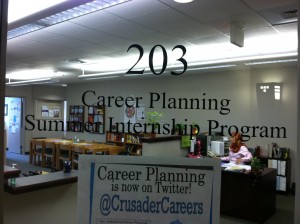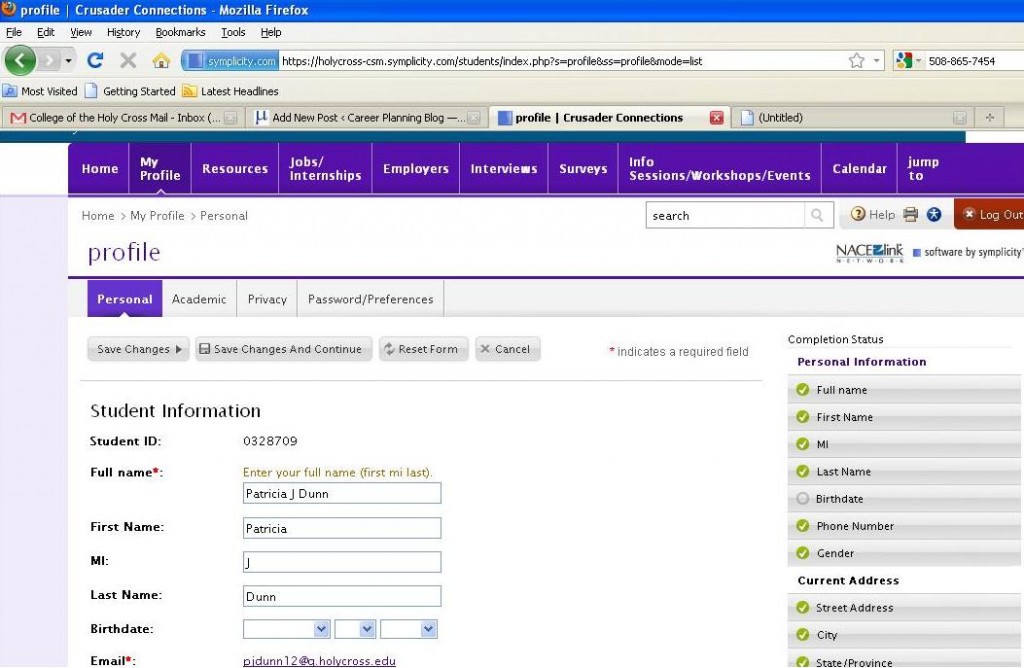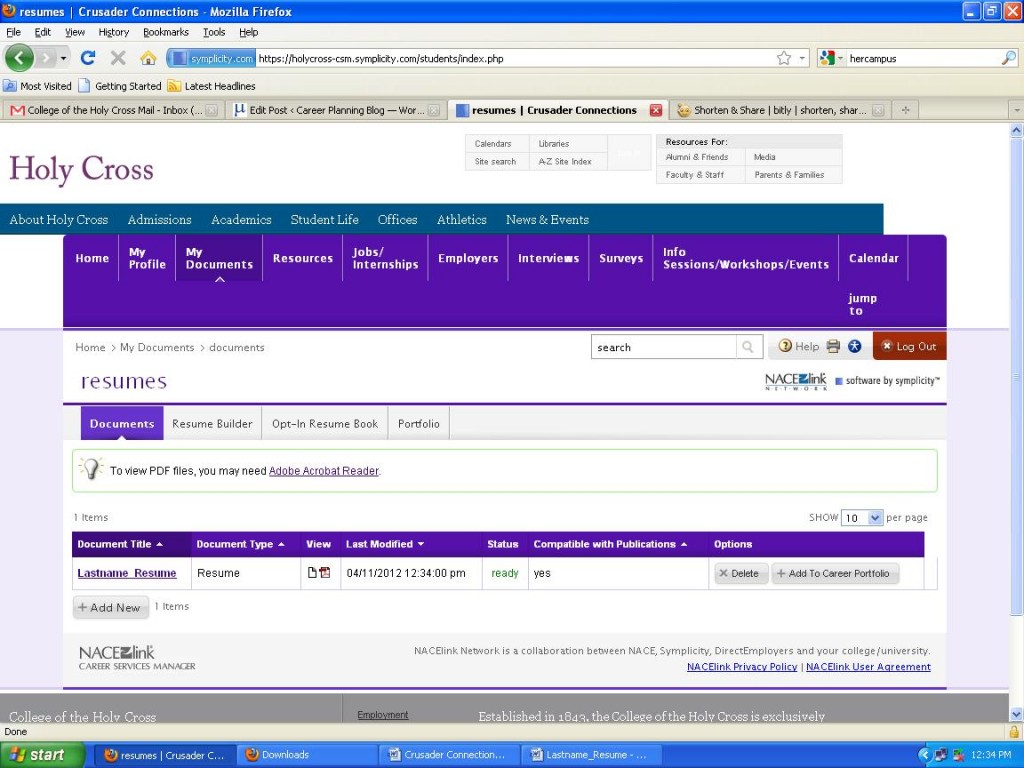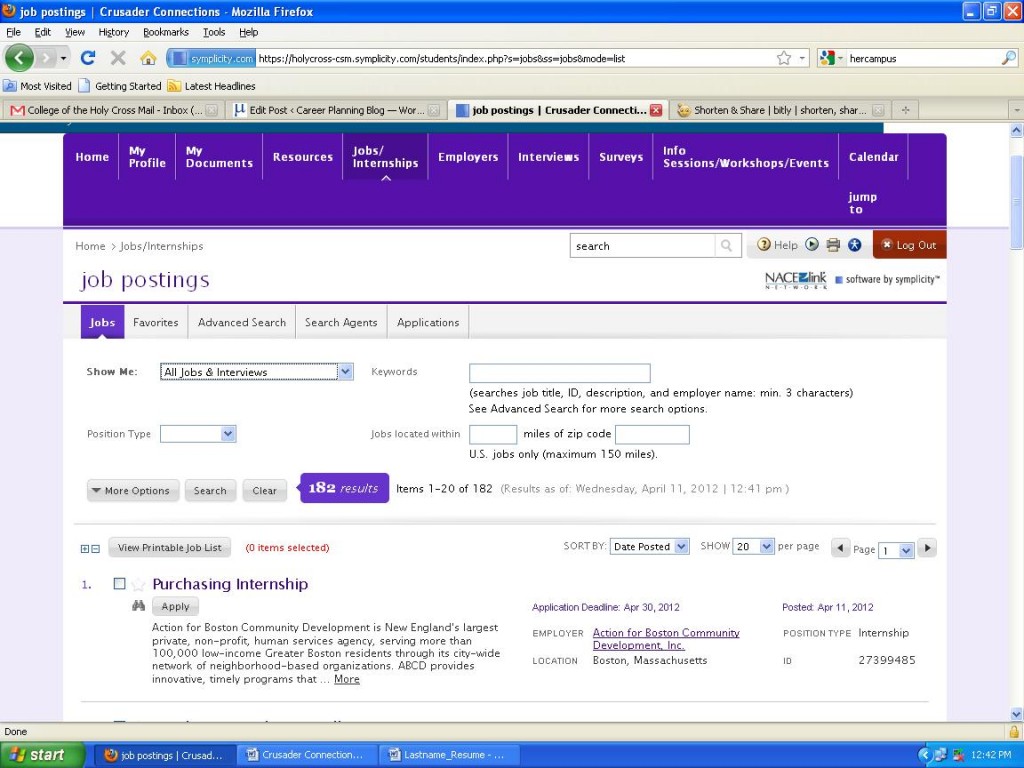
Today’s Alumni Guest Post comes from Kevin Leggio ’11, who, from his work in Human Resources has some tips for successful interviewing.
. . . . . . . . . . . .
Kevin Leggio ’11
Major: Psychology; Italian; Pre-Business
Industry: Human Resources/Organizational Development
Congratulations! You are now entering into one of the more challenging aspects of the “real world” and you aren’t even in it yet: getting an entry-level job.
Not to fear. Getting an entry-level job isn’t the easiest thing, but it’s not impossible either. Even if you feel you don’t have the “E word” (Experience), you would be surprised at how relevant and transferable your Holy Cross education is when it comes to finding a job.
In my current entry-level job, I interview candidates for various positions and work directly with a corporate recruitment department, giving me some insight into the do’s and dont’s of interviewing for jobs.
Based on my experience, here are some helpful tips for landing a good entry-level job and for being successful in the “real world” after Holy Cross:
1. Network. I know you hear this all the time, but trust me, successful networking can do wonders for you personally and professionally. You have a sea of alumni who are willing and able to lend a helping hand and seemingly unlimited resources to connect you to people all over the world. Whether it’s looking up alumni in a particular field and finding out what entry-level compensation is for that position, or setting up an informational lunch to discuss how an alum got into their field and advanced their career, you can’t go wrong with simple networking. It’s not always going to result in a job, but understanding the field can sure can help you get ahead. (Plus, a free lunch doesn’t hurt here and there… especially when first starting out.) Moreover, you never know when your network will give back to you. (Spoiler alert: see #5.)
2. Sell yourself. The job market is still pretty competitive and although many companies are hiring, they are looking for someone who can come in, learn fast, and be a team player. What better than a Holy Cross student?! Coming from an institution that embraces these key elements, you have an advantage… so use it! When interviewing, make sure that you highlight experiences in your Holy Cross education and elsewhere that show these qualities.
3. You don’t always have to know everything. Specific job knowledge is not always expected in an entry-level position—you are not required to be a subject matter expert. However, the potential and capacity to learn the job over time is important.
Although it can be difficult to start at the bottom again, help yourself out by researching the fields and companies that you are interested in to find out as much about the industry as you can. Look into educational resources, get some books (the “Dummies” series are like Spark-notes for the real world) and tap into any alumni resources that you can to get internal information (again, networking!).
4. Use your “non-negotiables.” Employers look for prospects who have not only the intellectual bandwidth to learn the job, but the interpersonal skills to be a successful and invaluable member of the team. Employers sometimes call these “non-negotiables,” or soft skills that are expected and required for new employees and can’t always be taught on the job. Some employers don’t mind the time investment that it takes to train a new employee on job knowledge, but it is difficult to teach soft skills in the work place. Luckily for you, with an average class size of about twenty, Holy Cross has pretty much conditioned you to speak in public and interact with others… so make sure you emphasize these talents.
5. Never burn a bridge. This goes back to networking. Landing interviews is not always an easy task. However, when you do have an interview, make sure that you always get contact information and follow up. Also, even if you don’t get the job or a call back, treat your interviwers as part of your network. Don’t do anything that can hinder you from using them as a contact in the future.
I’m where I’m at today because I was referred to an agency by an employer who rejected me. I  inquired with the first employer as to why I didn’t get the position and asked if they had suggestions or resources that they could provide me with so that I could pursue an entry role in that field—and they did.
inquired with the first employer as to why I didn’t get the position and asked if they had suggestions or resources that they could provide me with so that I could pursue an entry role in that field—and they did.
Finally….
6. You are the interviewer too. When you are interviewing you are not only being interviewed by you are doing the interviewing. You are trying to see if the company would be a good place for you. If it seems like you’d be happy and can grow there, then it’s probably a pretty good place to start gathering some of the “E word.”
Happy Job Searching!












